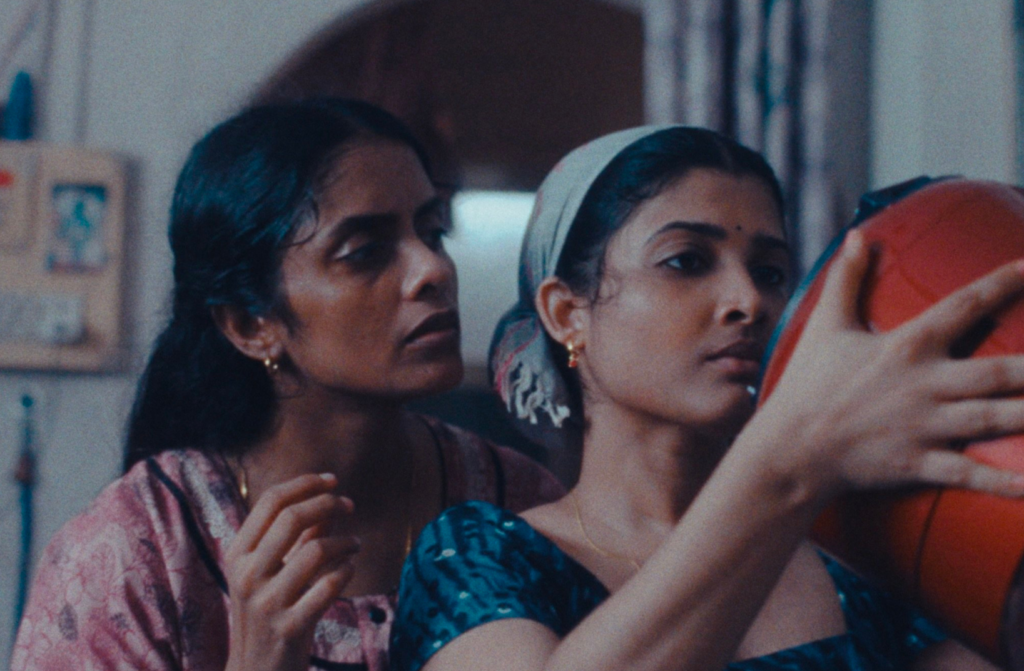The existential struggles of big city life have long been a much-discussed subject across various formats, including cinema. This theme is explored once again in the multi-award-winning film All We Imagine As Light, directed by Payal Kapadia. In it, life in a metro is viewed through Kapadia’s lyrical and evocative lens. She vividly captures the chaos and alienation of city life through her characters without forcing any quick resolutions.
The story follows two Malayali nurses from small towns in Kerala who are compelled to share a flat and live together in Mumbai. The elder nurse, Prabha (Kani Kusruti) was pressured by her family into an arranged marriage with a man she barely knew, who later moved to Germany. Since then, their communication has been minimal—they haven’t spoken in years. In contrast, the younger nurse, Anu (Divya Prabha) is more cautious about marriage, shaped by Prabha’s experiences. Anu is in a relationship with Shiaz (Hridhu Haroon), a Muslim. Both of them are fully aware of the likely hostility their union would face from each of their families even as they struggle to find privacy for their intimate moments in the city. Prabha gets involved in assisting a fellow hospital worker, Parvaty (Chhaya Kadam), who is seeking legal help to fight a builder attempting to demolish her chawl to construct a high-rise. Eventually, Parvaty is forced to abandon her fight and return to her home village in Ratnagiri. Prabha and Anu decide to accompany Parvaty to her village, embarking upon a journey that opens up a whole new world for them.
All We Imagine As Light is divided into two halves, each with a distinct purpose. The first half explores the bustling life of the city and its characters. The opening sequences incisively portray crowded marketplaces and packed local trains, aptly capturing the disorder and antipathy of urban life in all its myriad hues. Amid the hectic routines of the hospital, the daily train commutes, and life in their shared flat, the two nurses grapple with their identities, which are deeply entwined with the patriarchal norms and taboos of their familial backgrounds. These complexities are effectively conveyed with minimal scenes. The bits featuring Anu and her boyfriend playfully mocking photographs of potential suitors add a touch of lightness to an otherwise intense and grim first half. However, when Shiaz cancels one of their meetings, an unexpected fear grips Anu. She calls her mother immediately, underscoring the deep insecurity and distrust that city life has instilled in her. Prabha, in trying to connect with an inanimate object – the high-end pressure cooker sent presumably by her husband, sheds light on the vocational isolation and personal trauma of the characters, as well as their inability to seek happier and better alternatives in big city life.
In contrast, the second half shifts to a rural setting, where life is simpler yet more fulfilling. Despite their minimal resources, the characters are happy and find time for themselves. Prabha saves the life of a man (Anand Sami) retrieved by fishermen in their nets. Her hallucination of conversing with her husband in the man’s place takes the film into the realm of magical realism. She deeply empathizes with the man’s plight, as it mirrors her struggles. In a poignant moment, she finally releases him, asking him not to return. Symbolically, this represents her liberation and her journey toward finding peace with her present circumstances, contrasting sharply with her hospital life, where she was never able to take time for herself or connect her problems to anyone else. As she reflects on the beauty of Vidhura, a hill station in Kerala where Shiaz is from, and Ratnagiri, their current location, these places seem to offer her a response to her existential crisis, suggesting that a place feels beautiful when one finds happiness there.
Anu notices a single word amidst the inscriptions left by past visitors and lovers on the rugged cave walls of the village that deeply resonates with her: freedom. But unfortunately, the very next scene where Shiaz, who has followed her there, and her having sex undoes her liberation due to its awkward, extremely self-conscious and clumsy staging. This is one place where Kapadia, otherwise in full control of her cinematic craft, falls short.
Kani Kusruti as Prabha and Divya Prabha as Anu deliver outstanding performances, making their characters linger in the viewer’s mind long after the film ends. The subtlety both characters maintain throughout adds significantly to the natural flow of the movie. Kusruti’s silences, in particular, speak volumes as she stoicly struggles to maintain her sense of dignity amidst her life’s struggles. Chhaya Kadam as Parvaty and Azees Nedumangad as Dr Manoj, a Malayali doctor who has recently relocated to Mumbai and who finds he harbors feelings for Prabha, excel in their supporting roles. Hridhu Haroon, as Shiaz, Anu’s boyfriend, is perfectly suited to the character he portrays.
Ranabir Das’s cinematography deliberately evokes the aesthetics of 1980s parallel cinema, characterized by minimal lighting and subdued visual tones. By using modern technology to recreate that era’s mood and aligning it with the film’s narrative, his work deserves much praise for its courage and artistry. The editing by Clément Pinteaux is well-paced and enhances the film’s narrative flow while the background score and music by Topshe elevate the film to a poetic level.
All We Imagine As Light prompts viewers to reflect on their existential crises and the quality of life they lead, often overlooking happiness that could be found even in unassuming, less glamorous places. It reminds us that true contentment is not bound to external allure but to the joy we find within.
Malayalam, Hindi, Marathi, Drama, Color


